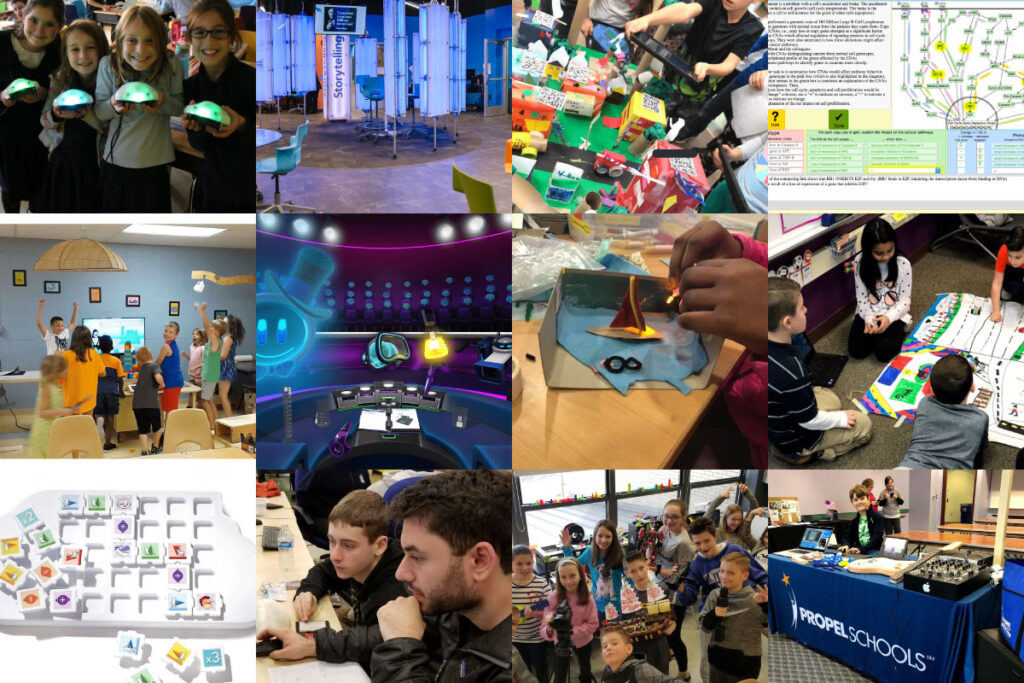As the lead of Remake Learning’s Computer Science and STE(A)M Ecosystem working groups, I was so excited to see so many excellent innovations submitted to the HundrED Spotlight on Pittsburgh that are helping young people access computer science and STEM and STEAM learning opportunities.
Computer science goes beyond simply teaching students to code. Computational thinking prepares students for coding tasks and using logic to solve problems. And cultivating digital literacy helps students see their own role and agency in interactions with technology.
Meanwhile, Science, Technology, Engineering, and Math (STEM) education is essential to preparing our students for the future as careers in this field are growing faster than those in other professions. And interdisciplinary learning, which brings the Arts into the acronym to create STEAM, helps students connect their knowledge and skills across subjects while solving problems creatively and collaboratively.
Educators in the Pittsburgh region are doing amazing things in these fields to help students learn, grow, and flourish. Here are my favorites from the HundrED Spotlight on Pittsburgh. Whether you’re looking for a way to get started with CS or STE(A)M in your classroom, or you just need a little inspiration, these innovations are worth checking out:
ArtEd21 is reestablishing the art classroom as the creative epicenter of the educational experience, shifting art education curriculum into a schoolwide, interdisciplinary structure.
The K-8 space is filled with engaging yet simple CS learning tools, but the next time many students see CS is in an AP computer science class. Carnegie Mellon University’s CS Academy bridges the gap between drag-and-drop beginner coding programs and advanced CS curriculum.
Through a co-teaching model at Canon-McMillan School District, teachers and students in grades K to 4 use coding as a learning tool to explore and master content in core academic subjects, creating an immersive coding program integrated directly into everyday classroom activities.
Expii is an online learning platform that lets students choose how they learn math and science by tailoring lessons and practice problems to their personal preferences and styles, providing the right challenges at the right time as students learn and advance.
Young people may be able skilled users of technology, but that doesn’t necessarily mean that they understand how it works, or how they can manipulate it themselves. Propel Schools’ digital literacy framework helps students K to 4 understand the technology around them and use it in life and learning.
Schell Games is exploring how to use virtual reality (VR) to help students practice real chemistry lab skills. HoloLAB Champions is a chemistry game show where students use VR equipment to conduct experiments in a virtual lab.
Inventionland Institute is a STEAM-based curriculum designed to encourage students to create real-world solutions to everyday problems.
Computational thinking is embedded into every grade level at South Fayette School District, from kindergarten through graduation. Through a series of interrelated projects that scaffold from school year to school year, every student in the district learns computational thinking, engineering, and human-centered design.
At the Carnegie Science Center Fab Lab, mentorship is integral to making—Mentors in the Making pairs low-income high school students with STEM professionals to prototype a capstone project that solves a challenge in the community.
Can bridging the physical and digital worlds help engage learners in STEM concepts? NoRILLA is a research-based mixed-reality platform that helps students build and test block structures and receive personalized, interactive feedback in the process.
Puzzlets engages early learners in STEM topics using tactical learning that connects real and virtual worlds, allowing for tablet-based or screen-free play.
Auberle is cultivating a love of learning with residential and homeless youth with STEAM and Maker activities, and a mobile component to the program helps make this learning happen anywhere.
The Cognitive Tutor for Analysis in Genetics is a project of Carnegie Mellon University that helps students learn to think like a biologist using an idea called “pathway algebra.”
The Finch was designed to make CS and engineering more engaging by giving students a real robot that can be manipulated using a variety of coding languages. Their loan program makes the Finch available to classrooms for free.
It was very hard to choose favorites—so many inspiring innovations were submitted to the HundrED Spotlight on Pittsburgh. You can check out all 82 submissions here!
